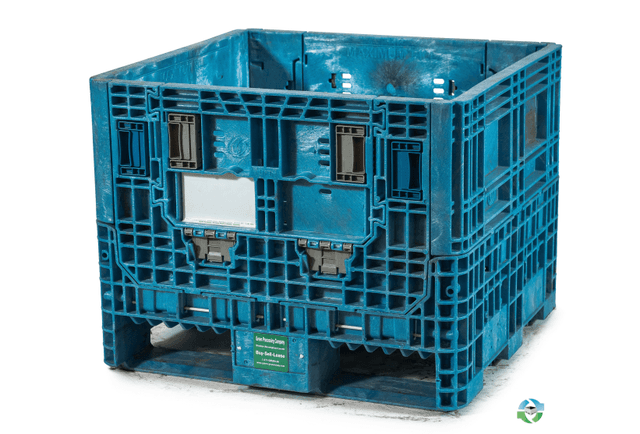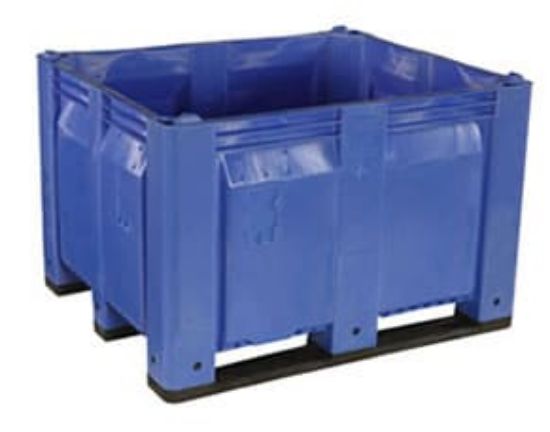Explore efficient storage ideas using refurbished bulk containers in manufacturing
Wiki Article
The Ultimate Overview to Selecting the Right Mass Containers for Your Service Requirements
Choosing the proper bulk containers is vital for any company that counts on effective logistics. Different types of containers exist, each developed for specific products and applications. Aspects such as size, product compatibility, and regulative standards play a considerable role in this decision-making procedure. Understanding these components can lead to improved operational performance. Numerous organizations ignore crucial aspects that could enhance their total effectiveness and sustainability. What are these factors to consider?Comprehending Different Kinds of Mass Containers
Bulk containers offer as necessary tools for organizations looking for reliable storage space and transportation remedies. These containers come in various kinds, each created to satisfy particular operational needs. One typical kind is the intermediate bulk container (IBC), which is ideal for granulated and liquid materials, offering a balance of capacity and ability to move. An additional preferred alternative is the mass bag, or FIBC, ideal for completely dry, flowable products. These versatile containers are lightweight and can be conveniently carried and saved. For much heavier products, rigid bulk containers are frequently employed, providing resilience and security for safe handling. Additionally, there are customized containers tailored for harmful products, making certain compliance with safety and security regulations. Understanding the distinctive attributes of these bulk container kinds allows businesses to make educated choices that enhance logistics and decrease prices. By choosing the ideal container, companies can enhance their operational efficiency and streamline their supply chain processes.Key Product Factors To Consider for Mass Containers
When selecting bulk containers, it is vital to consider the materials used in their construction. Aspects such as longevity, stamina, and chemical compatibility play an important role in ensuring the containers fulfill certain operational requirements. In addition, weight and mobility problems can influence both effectiveness and transportation logistics.Material Resilience and Strength
Sturdiness and stamina are crucial consider selecting materials for bulk containers, as they straight affect the container's capacity to withstand various ecological problems and managing procedures. Materials such as high-density polyethylene (HDPE), polypropylene, and stainless steel are generally favored for their robust buildings, offering resistance to temperature, abrasion, and effect changes. The choice of product also affects the overall lifespan of the container; more powerful products generally result in less constant replacements, bring about set you back savings over time. Furthermore, the weight of the product can influence delivery prices and simplicity of handling. Organizations have to consider their details functional environments and the potential for wear and tear to ensure peak longevity and toughness in their bulk container selection.Chemical Compatibility Elements
Comprehending chemical compatibility is important for selecting mass containers, as the products made use of must stand up to the particular compounds they will hold. Various factors influence compatibility, including the chemical nature of the materials, temperature level, and duration of storage. As an example, corrosive chemicals might require containers made from stainless-steel or specialized plastics that resist deterioration. In addition, responsive materials can create heat or gases, demanding vented or pressure-rated containers. The selection of container material, whether polycarbonate, polyethylene, or steel, need to line up with the chemical properties of the kept substances to avoid violations or leakages. Ultimately, a thorough assessment of these compatibility aspects assures safe handling and storage, safeguarding both employees and the setting while preserving item honesty.Weight and Mobility Problems
Choosing bulk containers entails not only reviewing chemical compatibility however likewise taking into consideration weight and transportability. Organizations must evaluate the convenience of handling and transportation to maximize performance. Lightweight materials like high-density polyethylene (HDPE) or light weight aluminum can facilitate easier movement and decrease shipping expenses. Conversely, larger containers might supply improved sturdiness yet can impede movement, particularly in atmospheres requiring constant moving. In addition, the design of the container ought to enable for hassle-free training and piling, making sure ergonomic security for employees. Companies must likewise think about the framework offered for transportation; for instance, containers suitable with forklifts or pallet jacks can enhance procedures. Inevitably, the right balance in between weight and mobility straight affects functional efficiency and expense efficiency.Sizing Your Bulk Containers for Optimum Effectiveness
When sizing mass containers, services must carefully analyze the dimensions required to accommodate their particular products. Additionally, weight ability is an important factor that affects effectiveness and safety throughout transport and storage. Efficient sizing not just takes full advantage of room however additionally enhances operational workflows.Determining Container Dimensions
Selecting the appropriate measurements for bulk containers is vital for maximizing effectiveness in storage and transport. Businesses must examine their details requirements, thinking about aspects such as offered area, the nature of the goods being kept, and the methods of transportation made use of. Accurate dimensions ensure that containers fit preferably in storehouses and cars, decreasing wasted room and minimizing managing time. Requirement sizes can supply comfort, but check over here personalized measurements may be needed for one-of-a-kind demands or to fit specific products. Additionally, it is very important to evaluate piling capabilities and availability, as these aspects influence general functional efficiency. Eventually, the appropriate dimensions bring about enhanced organization and streamlined logistics, profiting the general productivity of the company.Weight Ability Considerations
Comprehending weight capability is crucial for services aiming to optimize their mass container effectiveness. The weight capacity of a container straight impacts storage space capabilities, transport logistics, and total operational prices. Choosing containers with the proper weight limitations guarantees that companies can safely save and move their goods without taking the chance of damages or compliance issues. Overloading containers can lead to architectural failures, while underutilizing ability cause wasted resources. When selecting containers, it is essential for services to analyze their product weights and think about any type of regulatory needs. In addition, aspects such as the sort of product, meant use, and ecological problems should also influence weight capacity decisions. By examining these components, businesses can enhance effectiveness and guarantee a structured supply chain.Regulatory Conformity and Security Criteria

Regulatory conformity and safety and security criteria play a crucial function in the choice of bulk containers for organizations. Organizations should assure that their containers satisfy numerous laws established by neighborhood, nationwide, and worldwide authorities. These standards typically relate to product safety and security, structural integrity, and correct labeling, which aid protect against accidents and assure the secure transportation of products.
In addition, adherence to industry-specific standards, go right here such as those from the Fda (FDA) or the Occupational Safety and Health Administration (OSHA), is critical for business managing unsafe products or food items. Non-compliance can lead to fines, lawful concerns, or damages to a business's online reputation.
Organizations should also consider the container's compatibility with the materials being stored or carried to prevent contamination or chain reaction (used collapsible containers). To sum up, recognizing and applying governing compliance and safety standards is essential for the reliable and liable use of bulk containers
Sustainability Options for Eco-Friendly Mass Containers

Companies are also discovering options made from recycled materials, which not just preserve sources yet additionally support the reusing market. Developments in style enable for lighter containers that require much less energy to transportation, further enhancing sustainability. By incorporating these green bulk container alternatives, services can demonstrate their dedication to ecological stewardship while fulfilling customer demand for lasting practices. This shift not only helps the planet yet can likewise boost brand reputation and client loyalty.
Cost-Effectiveness and Budgeting for Mass Containers
While numerous organizations focus on sustainability, cost-effectiveness remains a crucial element when picking bulk containers. Organizations should assess the initial purchase price, as well as lasting functional Recommended Reading prices, to guarantee financial feasibility. Variables such as reusability, upkeep, and longevity play a significant role in figuring out total expenses.Buying top notch containers might produce higher ahead of time prices however can bring about financial savings through reduced substitute rates and decreased waste. In addition, services must take into consideration transportation costs and storage effectiveness, as these can affect the overall budget.

Often Asked Inquiries
How Do I Determine the Right Container for Hazardous Products?
To establish the right container for harmful products, one must examine compatibility with the compound, think about the container's material, look for governing conformity, and assess capability and security attributes to assure appropriate handling and storage.Can Mass Containers Be Customized for Particular Products?
Yes, bulk containers can be tailored for details products. used collapsible bulk containers. Numerous functions, such as material, design, and size, can be customized to meet distinct needs, ensuring ideal safety and security and performance for transporting and storing different itemsWhat Is the Typical Lifespan of Various Bulk Container Types?
The typical life-span of mass container kinds varies; plastic containers last 5-10 years, metal containers 10-20 years, and wood containers normally last 3-7 years, relying on use, maintenance, and ecological conditions.Just how Should I Clean and Maintain Mass Containers?
To clean and preserve bulk containers, one ought to regularly evaluate for damage, remove residue, clean with appropriate detergents, rinse thoroughly, and warranty proper drying out prior to storage space. Adhering to supplier guidelines boosts durability and safety and security throughout use.Exist Rental Alternatives for Bulk Containers Available?
Yes, numerous business supply rental options for bulk containers, providing versatility for services. These services can suit various demands, enabling business to handle supply successfully without the dedication of acquiring containers outright.Resilience and toughness are crucial variables in choosing materials for mass containers, as they straight affect the container's capability to stand up to different environmental conditions and handling procedures. Recognizing chemical compatibility is vital for selecting bulk containers, as the materials made use of have to withstand the certain materials they will hold. Recognizing weight capacity is important for companies aiming to enhance their mass container performance. Regulative compliance and safety standards play a vital function in the selection of mass containers for organizations. While several businesses focus on sustainability, cost-effectiveness continues to be an essential aspect when picking mass containers.
Report this wiki page